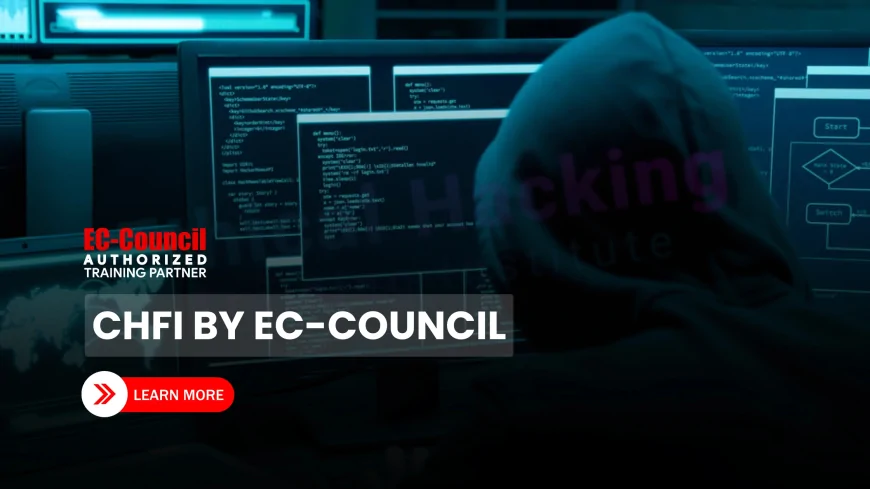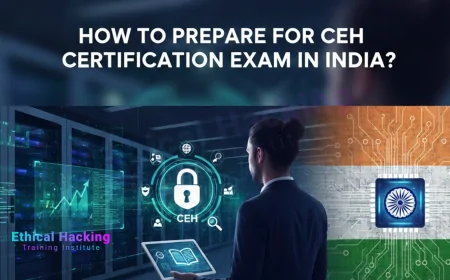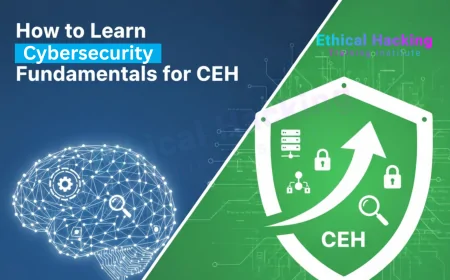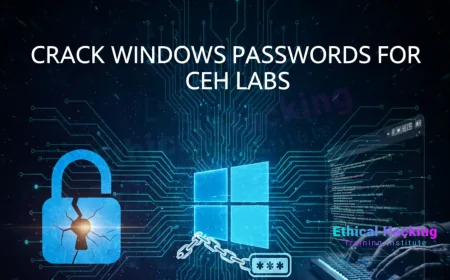EC Council’s Computer Hacking Forensic Investigator Course: A Top Choice for Aspiring Forensic Experts
Discover why EC-Council’s Computer Hacking Forensic Investigator (CHFI) course is the top choice for future digital forensic experts. Learn modules, tools, job roles, and certification benefits.

Table of Contents
- Introduction
- What is EC-Council's CHFI Certification?
- Why CHFI is a Top Choice for Forensic Careers
- CHFI Course Modules
- Forensic Tools Covered in CHFI
- Career Paths After CHFI Certification
- Job Roles & Salary Expectations
- CHFI vs Other Forensic Certifications
- CHFI Exam Details
- Preparation Tips for CHFI
- FAQs
- Conclusion
Introduction
In an age where data breaches, ransomware attacks, and insider threats are growing exponentially, digital forensics has become a cornerstone of cybersecurity. Organizations need skilled professionals who can identify, collect, analyze, and present digital evidence responsibly and legally. EC-Council’s CHFI certification is a leading, in-depth program for those pursuing careers in digital forensics and cybercrime investigation.
This article will walk you through what the CHFI course entails, why it is considered a gold standard in the industry, and how it can shape your career in digital forensics.
What is EC-Council's CHFI Certification?
The CHFI certification is an advanced-level, vendor-neutral program offered by EC-Council that teaches how to detect hacking attacks, gather evidence, and conduct forensic analysis. It is designed for IT professionals, law enforcement personnel, and cybersecurity experts who are responsible for investigating cyber incidents and presenting digital evidence in legal proceedings.
CHFI v10, the latest version, is equipped with updated modules and tools to keep pace with the latest forensic practices, including mobile and cloud forensics, malware analysis, and anti-forensic tactics.
Why CHFI is a Top Choice for Forensic Careers
- Industry-Recognized: CHFI is ANSI-accredited and recognized globally by law enforcement agencies, corporations, and government bodies.
- Practical Training: Includes hands-on labs, real-world scenarios, and exposure to more than 50 forensic tools.
- Forensic Legality: Trains professionals to preserve evidence in a way that upholds legal standards and protects the chain of custody
- Versatility: Covers disk, memory, network, mobile, IoT, and cloud forensics.
- Job-Focused: Equips you for high-demand roles like Forensic Analyst, Incident Responder, or Legal Evidence Consultant.
CHFI Course Modules
CHFI v10 features 14 comprehensive training modules, each focusing on a core area of cyber forensics
- Computer Forensics in Today’s World
- Investigation Processes and Legal Compliance
- Understanding Hard Disks and File Systems
- Data Acquisition and Duplication
- Operating System Forensics
- Memory and Malware Forensics
- Network Forensics
- Database and Email Forensics
- Cloud and IoT Forensics
- Mobile Device Forensics
- Dark Web and Steganography Investigations
- Forensic Report Writing and Documentation
Forensic Tools Covered in CHFI
Over 50 tools are covered in CHFI training. Some of the key ones include:
- FTK (Forensic Toolkit)
- Autopsy & Sleuth Kit
- Wireshark
- EnCase
- X-Ways Forensics
- Volatility Framework
- OSForensics
Career Paths After CHFI Certification
After completing CHFI, professionals can pursue roles in various sectors, including law enforcement, financial institutions, IT security companies, and consulting firms. Roles include:
- Digital Forensic Analyst
- Cybercrime Investigator
- Incident Responder
- Fraud Analyst
- Information Security Officer
Job Roles & Salary Expectations
Salaries vary based on geography and experience:
- India: ₹6 – ₹20 LPA
- USA: $75,000 – $140,000 annually
Top recruiters include government agencies, police cyber cells, Deloitte, IBM, EY, Accenture, and MNCs with incident response teams.
CHFI vs Other Forensic Certifications
| Certification | Provider | Focus |
|---|---|---|
| CHFI | EC-Council | Complete digital forensics & investigation |
| GCFA | SANS GIAC | Advanced forensic analysis |
| EnCE | OpenText | Tool-specific (EnCase) |
| CFCE | IACIS | Law enforcement-focused |
CHFI Exam Details
- Exam Code: 312-49 (CHFI v10)
- Duration: 4 hours
- Questions: 150 MCQs
- Passing Score: 70%
- Format: Online, proctored via ECC Exam Center
Preparation Tips for CHFI
- Study the official CHFI courseware and exam guide.
- Practice on virtual forensic labs using Autopsy or FTK Imager.
- Join EC-Council forums, Discord groups, and Reddit communities.
- Revise forensic concepts with flashcards and mind maps.
- Take practice tests and simulations under timed conditions.
Frequently Asked Questions (FAQs)
1. What does CHFI stand for?
CHFI stands for Computer Hacking Forensic Investigator, a certification by EC-Council.
2. Is CHFI certification suitable for beginners?
Yes, it’s suitable for beginners with basic networking or cybersecurity knowledge.
3. How long does it take to prepare for CHFI?
Typically 2–3 months, depending on your background and study time.
4. Is CHFI recognized globally?
Yes, it’s ANSI-accredited and accepted by enterprises and law enforcement worldwide.
5. What is the cost of CHFI certification?
Costs range from ₹35,000–₹90,000 in India and $600–$1500 internationally.
6. Does CHFI require programming skills?
No, but knowledge of scripting and command-line tools helps in analysis tasks.
7. Can CHFI help in getting government jobs?
Yes, it is preferred by cyber cells, police units, and national security agencies.
8. What are the prerequisites for CHFI?
There are no strict prerequisites, but CEH-level understanding is recommended.
9. What tools are used in CHFI training?
FTK, EnCase, Autopsy, Wireshark, X-Ways, and more.
10. Is CHFI exam difficult?
It’s considered moderately difficult; consistent preparation ensures success.
11. How is CHFI different from CEH?
CEH focuses on ethical hacking; CHFI focuses on investigating and analyzing cybercrimes.
12. Is the CHFI exam online?
Yes, it’s available online with remote proctoring.
13. What jobs can I apply for after CHFI?
Digital Forensic Analyst, SOC Analyst, Incident Responder, among others.
14. Is CHFI worth it in 2025?
Absolutely, given the surge in cybercrime and digital fraud globally.
15. Does EC-Council provide a digital badge?
Yes, upon certification you receive a verifiable digital badge and PDF certificate.
16. Are CHFI skills relevant for freelancing?
Yes, many forensic professionals offer consulting, audits, and litigation support.
17. What’s the validity of CHFI certification?
CHFI is valid for 3 years, after which you can renew via Continuing Education credits.
18. Does CHFI cover mobile and cloud forensics?
Yes, it has updated modules on mobile device, IoT, and cloud investigation.
19. What is the passing score of CHFI exam?
The passing score is approximately 70%, though it may vary slightly by version.
20. Can CHFI help in legal investigations?
Yes, it provides the skills to collect and present court-admissible digital evidence.
Conclusion
The demand for skilled digital forensic professionals is only growing, and EC-Council’s CHFI course provides the right blend of theoretical knowledge and practical experience. Whether you're an IT auditor, system admin, police officer, or aspiring cybersecurity analyst, CHFI offers you a powerful gateway into digital crime investigation. With global recognition, legal credibility, and hands-on labs, CHFI truly stands out as a top choice for anyone pursuing a forensic cybersecurity career.
What's Your Reaction?
 Like
0
Like
0
 Dislike
0
Dislike
0
 Love
0
Love
0
 Funny
0
Funny
0
 Angry
0
Angry
0
 Sad
0
Sad
0
 Wow
0
Wow
0

















